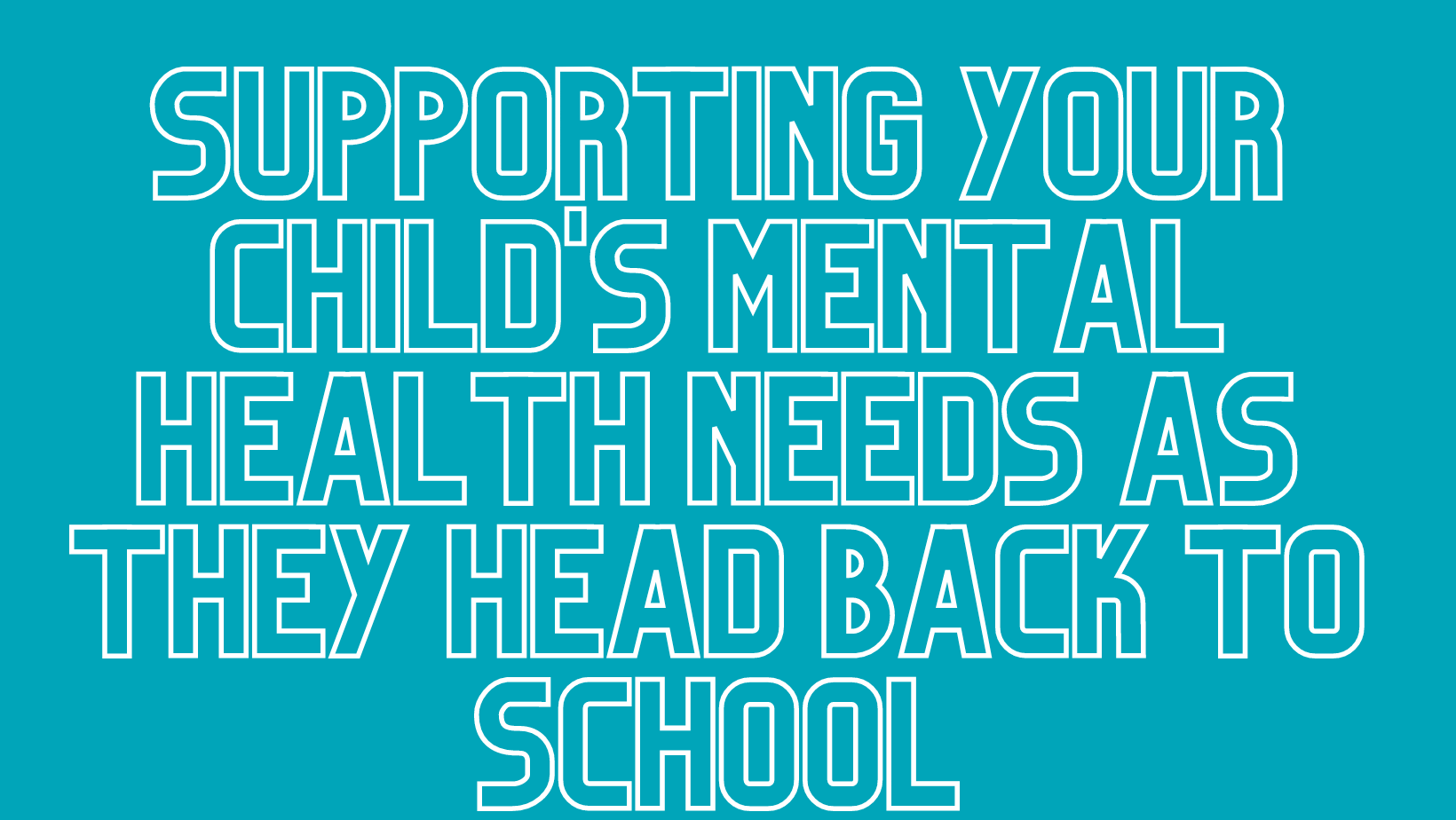
Nurturing Minds: Back-to-School Tips to Support Kids’ Mental Health Needs
As the summer days begin to wane, the arrival of a new school year can be both exciting and overwhelming for children. Transitioning from the relaxed routines of vacation to the structured environment of classrooms can put a strain on their mental well-being.
In this blog post, we will explore valuable back-to-school tips that parents, educators, and caregivers can employ to support children’s mental health needs and ensure a smooth and successful transition into the school year. With the right strategies, we can create an atmosphere of understanding, resilience, and growth for our young learners.
Open Communication Channels
Effective communication forms the bedrock of any supportive environment. Encourage open dialogue with your child about their feelings, anxieties, and expectations surrounding the upcoming school year. Actively listen to their concerns and validate their emotions. Assure them that their experiences and opinions matter, fostering a sense of security and trust.
Establish Routines
Predictability and structure provide children with a sense of security, especially during times of change. Create a consistent routine that encompasses daily activities, including regular wake-up and bedtime schedules, homework time, and extracurricular activities. A well-established routine helps children feel more organized, reducing back-to-school anxietyand promoting mental well-being.
Encourage Healthy Lifestyle Habits
Physical and mental health are intricately linked. Ensure your child gets enough sleep, engages in regular exercise, and follows a nutritious diet. Adequate sleep and physical activityboost mood, increase focus, and reduce stress levels. Encourage healthy eating habits by involving your child in meal planning and preparation and emphasize the importance of a balanced diet.
Foster Social Connections
Strong social connections are crucial for positive mental health. Help your child cultivate friendships by encouraging social interactions in and outside the classroom. Arrange playdates, encourage extracurricular activities, and support participation in team sports or clubs that align with their interests. These experiences foster a sense of belonging and enhance social skills, promoting resilience and emotional well-being.
Teach Stress Management Techniques
School life can sometimes be stressful, and teaching children effective stress management techniques equips them with valuable coping skills. Encourage relaxation practices such as deep breathing exercises, mindfulness, or engaging in hobbies they enjoy. Help them identify their stress triggers and explore healthy ways to manage them, such as talking to a trusted adult, journaling, or engaging in creative outlets.
Address Bullying and Peer Pressure
Bullying and peer pressure can have a profound impact on a child’s mental health. Discuss the importance of respectful behavior, empathy, and inclusion with your child. Encourage them to report any instances of bullying, assuring them that seeking help is a sign of strength. Foster a supportive environment at home that promotes kindness, empathy, and standing up against bullying.
Collaborate with Educators
Maintain open lines of communication with your child’s teachers and school staff. Share any pertinent information about your child’s mental health needs or concerns. Collaborate on strategies to address potential challenges and ensure consistency between home and school environments. Establishing a partnership with educators promotes a holistic approach to supporting your child’s mental well-being.
Prioritize Self-Care
Parents and caregivers play a pivotal role in supporting children’s mental health, but it’s equally essential to prioritize self-care. Take time for yourself, engage in activities that recharge your energy, and seek support from your own social network or professional resources when needed. Your well-being sets a positive example for your child and enables you to provide the best support possible.
As we gear up for another school year, let’s prioritize the mental health needs of our children. By fostering open communication, establishing routines, encouraging healthy habits, promoting social connections, teaching stress management techniques, addressing bullying, collaborating with educators, and prioritizing self-care, we create a supportive environment for our young learners to flourish academically and emotionally. Together, let’s take the next step towards nurturing the minds of our children and fostering their mental well-being.
Our multidisciplinary team is here to support you, your child, and your family as you head back to school. To schedule an appointment, click here.
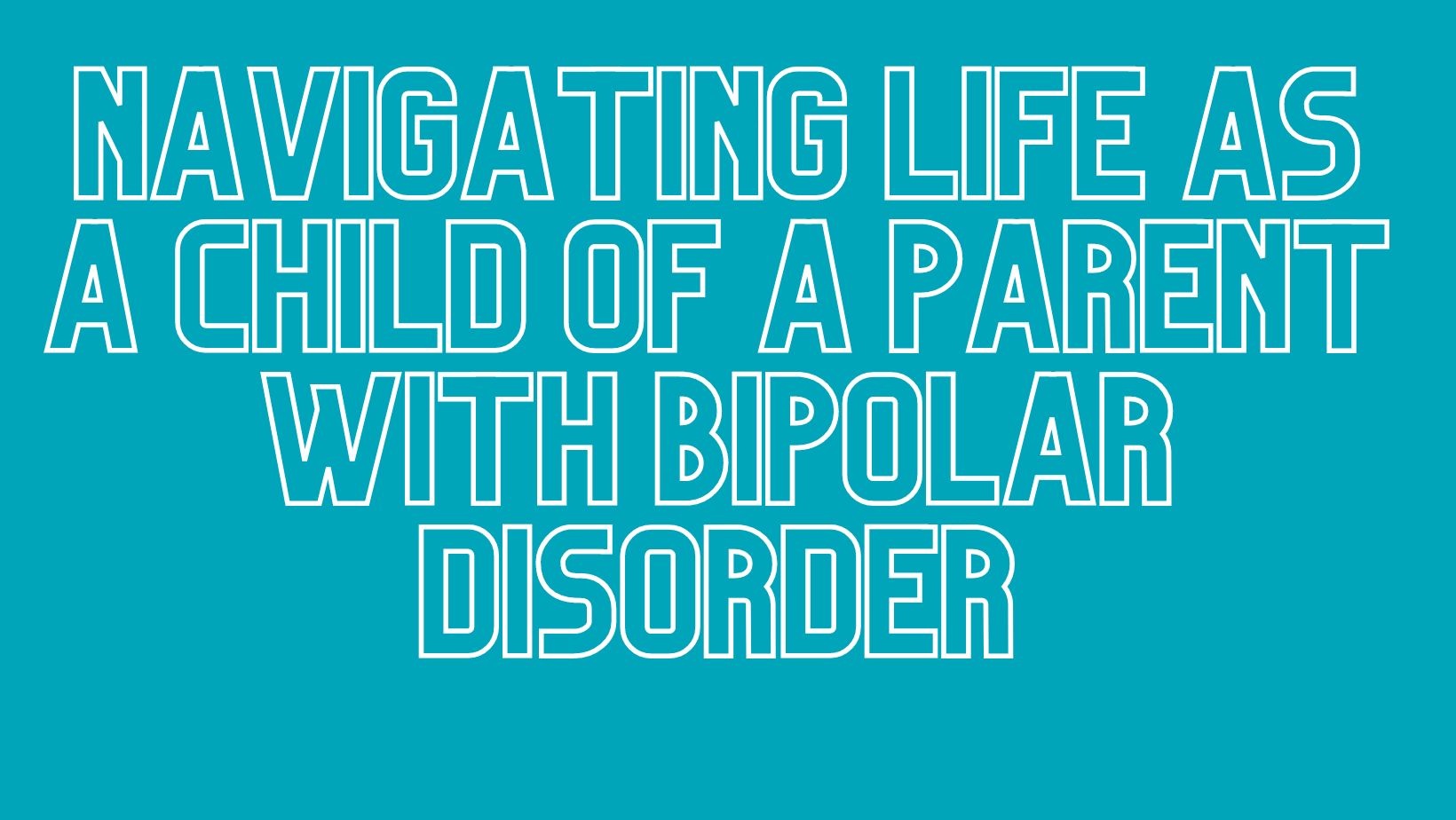
Thriving Under One Roof: Navigating Life as the Child of Someone with Bipolar Disorder
Growing up with a parent who has bipolar disorder can be challenging and complex, but it doesn’t mean that you can’t lead a fulfilling life. It’s essential to recognize that mental health impacts the entire family, and finding ways to create a thriving environment is crucial for everyone involved.
In this blog post, we’ll explore various strategies and resources that can help you, as the child of someone with bipolar disorder, build a supportive and flourishing life under one roof.
Understanding Bipolar Disorder
Education is the first step towards building a supportive environment. Take the time to learn about bipolar disorder, its symptoms, and treatment options. Understanding the condition can help you empathize with your parent’s experiences, reduce stigma, and foster open communication.
Understanding bipolar disorder can be overwhelming, but let’s break it down into the top things you need to know:
- Subtypes of Bipolar Disorder: Bipolar disorder is categorized into three main subtypes. Bipolar I disorder involves episodes of extreme high energy and agitation known as mania. Bipolar II disorder involves episodes of mild to moderate mania alternating with episodes of moderate to extreme depression. Cyclothymia is characterized by simultaneous depression and mania episodes. Some individuals may experience hypomania, which is a less intense form of mania.
- Duration of Episodes: Manic episodes can last for several days, during which individuals may display elevated mood, increased energy, impulsivity, and other symptoms associated with mania. It’s important to note that some types of bipolar disorder also include periods of depression, which can vary in duration.
- Treatment Options: Many individuals with bipolar disorder can effectively manage the condition over the long term with a combination of medication and talk therapy. Medications, such as mood stabilizers, can help regulate mood and prevent extreme fluctuations. Talk therapy, such as cognitive-behavioral therapy (CBT), can provide valuable support and help individuals develop coping strategies.
Remember, it’s essential to consult with a healthcare professional for an accurate diagnosis and personalized treatment plan. They can provide you with detailed information specific to your (or your parent’s) situation and guide you through the process of managing bipolar disorder effectively.
Take one step at a time, seek support from mental health professionals and support networks, and remember that with proper management, individuals with bipolar disorder can lead fulfilling lives.
Open Communication
Maintaining open and honest communication within the family is key. Encourage your parent to share their feelings and experiences, and express your own thoughts and concerns. Establishing a safe space for conversations can promote understanding, reduce tension, and create a supportive atmosphere for everyone.
If talking out loud isn’t always easy, consider journaling your thoughts.
Here at NextStep2MentalHealth, we offer a variety of therapy, including both individual and family.
Seek Support
Remember that you don’t have to navigate this journey alone. Seek support from trusted family members, friends, or support groups. The Depression and Bipolar Support Alliance provide resources both individuals who have a family member with bipolar disorder. Connecting with others who have similar experiences can provide a sense of belonging and validation, while also offering practical advice and coping strategies.
Establish Boundaries
Living with someone who has bipolar disorder can sometimes mean dealing with unpredictable moods and behaviors. It’s important to establish healthy boundaries to protect your own well-being. Communicate your needs clearly and respectfully, and work together with your parent to establish boundaries that promote a harmonious living environment.
Here’s a helpful guide on establishing and keeping healthy boundaries.
Self-Care
As a child of someone with bipolar disorder, it’s crucial to prioritize your own self-care. Take care of your physical and emotional well-being by engaging in activities you enjoy, practicing relaxation techniques, maintaining a healthy lifestyle, getting enough sleep, and seeking professional support if needed.
Remember, taking care of yourself is not selfish; it allows you to better support your parent and maintain your own mental well-being.
Educate Others
One way to break down the stigma surrounding mental health is to educate others about bipolar disorder. Share your experiences with trusted friends, teachers, or school counselors to raise awareness and foster understanding. By promoting empathy and acceptance, you contribute to creating a more inclusive and supportive community.
Accessing Resources
Take advantage of available resources and support networks. These resources can include support groups, therapy options, educational materials, and helplines. Reach out to these organizations for guidance and assistance in finding the right support for you.
Living with a parent who has bipolar disorder can be challenging, but it is possible to create an environment where everyone can thrive. By fostering open communication, seeking support, establishing boundaries, prioritizing self-care, educating others, and accessing available resources, you can build a fulfilling life under one roof. Remember that your well-being matters, and by taking care of yourself, you are better equipped to support your parent and create a positive family dynamic. Together, we can break the stigma and build a community where everyone feels understood and supported on their mental health journey.
We’re Here for You!
Are you seeking support and resources as a child of someone with bipolar disorder? NextStep2MentalHealth is here to help you thrive under one roof. Remember, you are not alone in this journey. Take the next step towards a flourishing life by reaching out to NextStep2MentalHealth. Together, we can navigate this path with empathy, understanding, and support. Click here to get started.
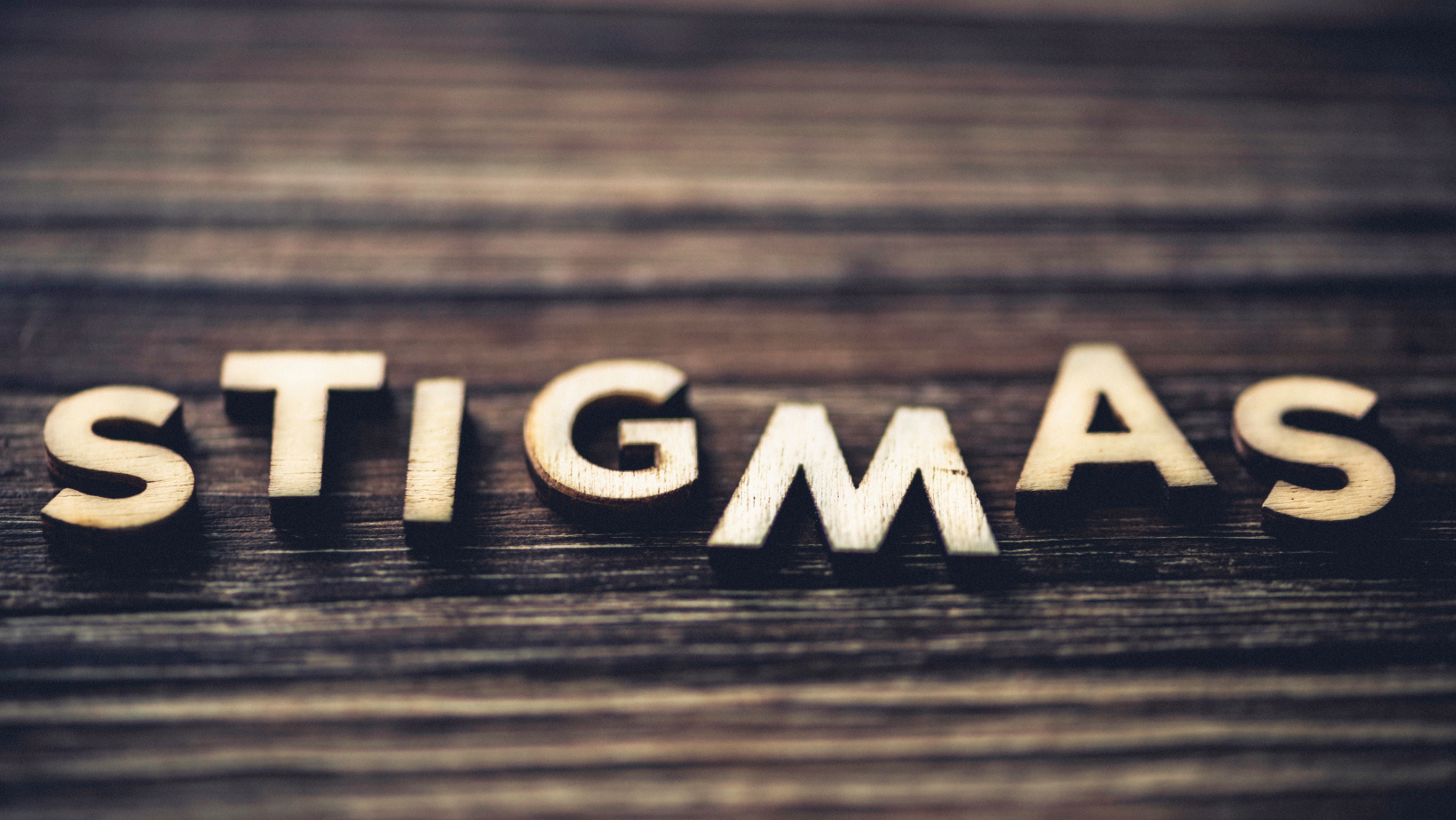
Breaking the Stigma of Bipolar Disorder
Bipolar spectrum disorder, previously known as manic depressive illness, is a mental health condition characterized by extreme mood swings that range from prolonged periods of high energy and euphoria (mania) to periods of intense sadness and hopelessness (depression). It is also characterized by abnormal sleep patterns.
Symptoms can range from mild to severe and patients can easily be misdiagnosed. Many people associate bipolar disorder with negative stereotypes, and the stigma can make it difficult for individuals living with bipolar disorder to seek help and receive the support they need.
If you need help managing bipolar disorder, we encourage you to seek the help you need. In the meantime, Dr. Ethan Short sheds light on tips for breaking the stigma of bipolar disorder.
Breaking the Stigma: Debunk the Myths
Breaking the stigma surrounding bipolar disorder is crucial for improving understanding and support for those living with this condition. By learning more about bipolar disorder and challenging common misconceptions, you can create a more supportive environment for loved ones living with this condition.
Myth #1: Bipolar Spectrum Disorder Is Rare
One of the most common misconceptions about bipolar spectrum disorder is that it is a rare condition. While severe Bipolar I disorder is more rare, less severe versions are more common. In reality, 4.4% of Americans will experience bipolar diagnosis at some point in their life. According to the World Health Organization, 40 million people were living with bipolar disorder in 2019.
Despite this, many people continue to believe that bipolar spectrum disorder is a rare or exotic condition, which can make it difficult for individuals to seek help and feel understood.
Myth #2: It’s “Just” Mood Swings
Another common misconception is that bipolar disorder is just another name for mood swings. While everyone experiences changes in mood, the mood swings associated with bipolar disorder are more extreme and can last longer than a week. These mood swings can have a significant impact on a person’s ability to function in daily life, making it difficult to work or maintain relationships.
Myth #3: Bipolar Disorder Can Make You Dangerous
Perhaps the most damaging misconception surrounding bipolar disorder is the belief that individuals with this condition are “crazy” or dangerous. In reality, individuals with bipolar disorder are no more likely to be violent than anyone else. They actually tend to be much more creative than others without the condition. However, this stereotype can make it difficult for individuals to feel accepted and supported by their communities, which can have a negative impact on their mental health.
Myth #4: You Can’t Live a Productive Life with Bipolar Disorder
Living with bipolar disorder can be challenging, but with the right support and treatment, individuals with this condition can live fulfilling and productive lives. Treatment typically involves a combination of medication, therapy, and lifestyle changes, such as optimizing daily routines, getting consistent sleep and regular exercise, and maintaining a healthy diet. Understanding how your condition affects the way you think can also be very beneficial.
Breaking the Stigma and Supporting Your Loved Ones
Breaking the stigma surrounding bipolar disorder is crucial for improving understanding and support for individuals living with this condition. By challenging common misconceptions and promoting empathy and understanding, you can create a more supportive environment for individuals living with bipolar disorder.
With increased awareness and understanding, we can help to break down barriers and ensure that everyone has access to the resources and support they need to live a happy and healthy life. You may find that reading more about bipolar disorder or joining a support group (for family members or caregivers of someone with bipolar disorder) can help you.
We’re Here for You
If you are struggling with any sort of mental health issues, seeking help from a mental health professional can make a significant difference in your life. Here at NextStep2MentalHealth, we understand that seeking help can be challenging, but we are here to support you every step of the way.
Our experienced mental health professionals provide a safe and supportive environment for you to explore your thoughts and feelings, develop coping strategies, and work towards your mental health goals. Don’t hesitate to reach out to us for help – we are here for you. Schedule your appointment here.
About Dr. Short
 Dr. Short graduated from University of South Carolina in Columbia, South Carolina, with a Bachelor of Arts in Psychology (Cum Laude). He spent 3 valuable years engaging in surgical research prior to completing medical school and psychiatric residency training at University of Louisville. He greatly enjoyed his time there gaining clinical skills and knowledge, as well as dedicating over 500 hours to educating medical students, residents, social workers, nursing staff, as well as volunteering his time to local high schools and guidance counselors to help educate the public on mental health needs in his community.
Dr. Short graduated from University of South Carolina in Columbia, South Carolina, with a Bachelor of Arts in Psychology (Cum Laude). He spent 3 valuable years engaging in surgical research prior to completing medical school and psychiatric residency training at University of Louisville. He greatly enjoyed his time there gaining clinical skills and knowledge, as well as dedicating over 500 hours to educating medical students, residents, social workers, nursing staff, as well as volunteering his time to local high schools and guidance counselors to help educate the public on mental health needs in his community.
He has his full medical license and board-certified by the American Board of Psychiatry and Neurology.
Dr. Short has extensive experience working with adults with severe mental illness including schizophrenia and bipolar disorders, addictions (opiates, methamphetamine, benzodiazepines, alcohol, tobacco, etc.), PTSD, depression and anxiety disorders, and adult ADHD. He is trained in multiple psychotherapies, but primarily practices Acceptance and Commitment Therapy as an alternative to medication, or as an adjunctive treatment for the above conditions.
You can now book an appointment with Dr. Short here. or give us a call at our Louisville, Kentucky mental health clinic at 502-339-2442.
Learn More
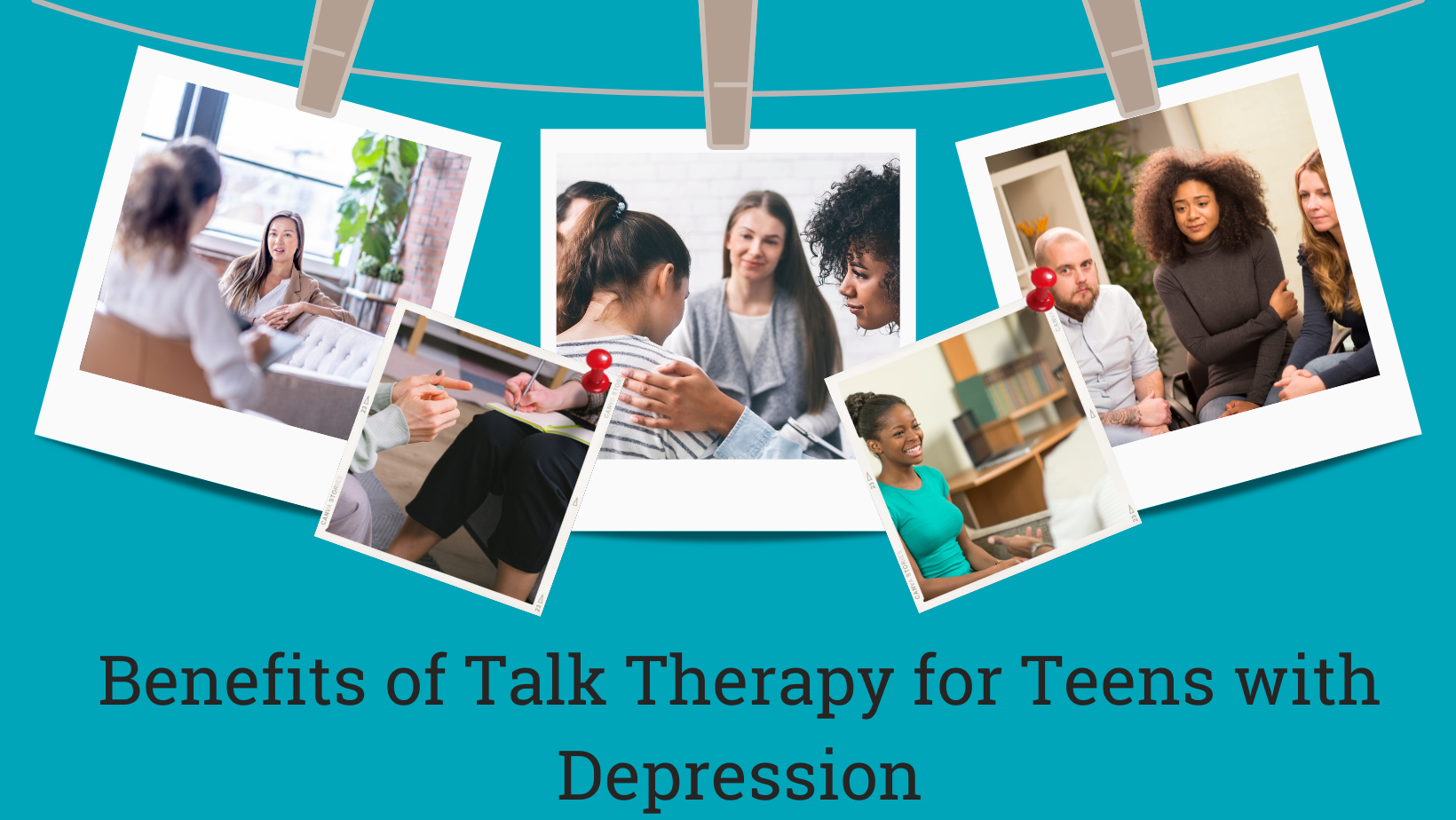
Depression and Anxiety in Teens: The Benefits of Talk Therapy
Depression and anxiety are common mental health issues that affect millions of people worldwide. For teenagers, these conditions can be particularly challenging, as they are still developing physically, emotionally, and socially. Talk therapy is a useful treatment option for teens dealing with depression and anxiety.
In this blog, we will discuss the benefits of talk therapy in helping teenagers manage their mental health.
Understanding Depression and Anxiety in Teens
Depression and anxiety are complex disorders that can manifest in different ways for different people. Teenagers with depression may experience feelings of sadness, hopelessness, and worthlessness. They may lose interest in activities they once enjoyed, have trouble sleeping or sleeping too much, and struggle with concentration and decision-making. Anxiety, on the other hand, can cause intense fear or worry about everyday situations, leading to physical symptoms such as trembling, sweating, and rapid heartbeat.
While these disorders can have various causes, including genetics, traumatic experiences, and environmental factors, talk therapy can be an effective way to address them.
How Talk Therapy Can Help
Talk therapy, also known as psychotherapy, is a form of treatment that involves talking to a licensed mental health professional. It can take many forms, including individual therapy, group therapy, and family therapy. In all cases, the goal is to help the patient better understand their thoughts, feelings, and behaviors and develop strategies to manage them.
In the case of depression and anxiety in teens, talk therapy can be particularly helpful in the following ways:
It provides a safe and supportive space to talk about feelings and concerns.
Teens may feel isolated or misunderstood, making it difficult to discuss their problems with friends or family members. Talk therapy offers a safe and confidential environment where they can express their thoughts and emotions without fear of judgment.
It can help identify triggers and develop coping skills.
Through talk therapy, teens can gain a better understanding of what triggers their depression or anxiety and learn techniques to manage these triggers. This may include relaxation techniques, cognitive-behavioral therapy, or mindfulness practices.
Kayla Sheeran shares, “The strategies that teens can learn in therapy when addressing anxiety and depression will give them tools in their tool belt to face life’s challenges both now and later in their lives.”
It can improve communication and relationships.
Talk therapy can help teens develop stronger communication skills, which can improve their relationships with family and friends. It can also teach them how to set boundaries and assert themselves in a healthy way.
It can prevent future mental health issues.
By learning coping skills and developing a better understanding of their mental health, teens can reduce the risk of developing future mental health issues. This can lead to improved overall well-being and a better quality of life
Therapy Teaches Life-Long Skills
“Regulating emotions, managing one’s internal dialogue, and forming healthy communication patterns are only a few of the many skills teens can develop in therapy that will be useful in every area of their lives–whether that be in academics, careers, relationships, or personal goals.”
Holistic Care for Depression in Louisville, Kentucky
Depression and anxiety are challenging conditions that can affect anyone, including teenagers. Talk therapy is a useful treatment option that can help teens better understand and manage their mental health. By providing a safe and supportive space to talk about their feelings and concerns, identifying triggers, and developing coping skills, talk therapy can improve communication, relationships, and overall well-being.
If you or a loved one is struggling with depression or anxiety, consider talking to a mental health professional about the benefits of talk therapy. Click here to schedule an appointment with our caring and compassionate team of providers.
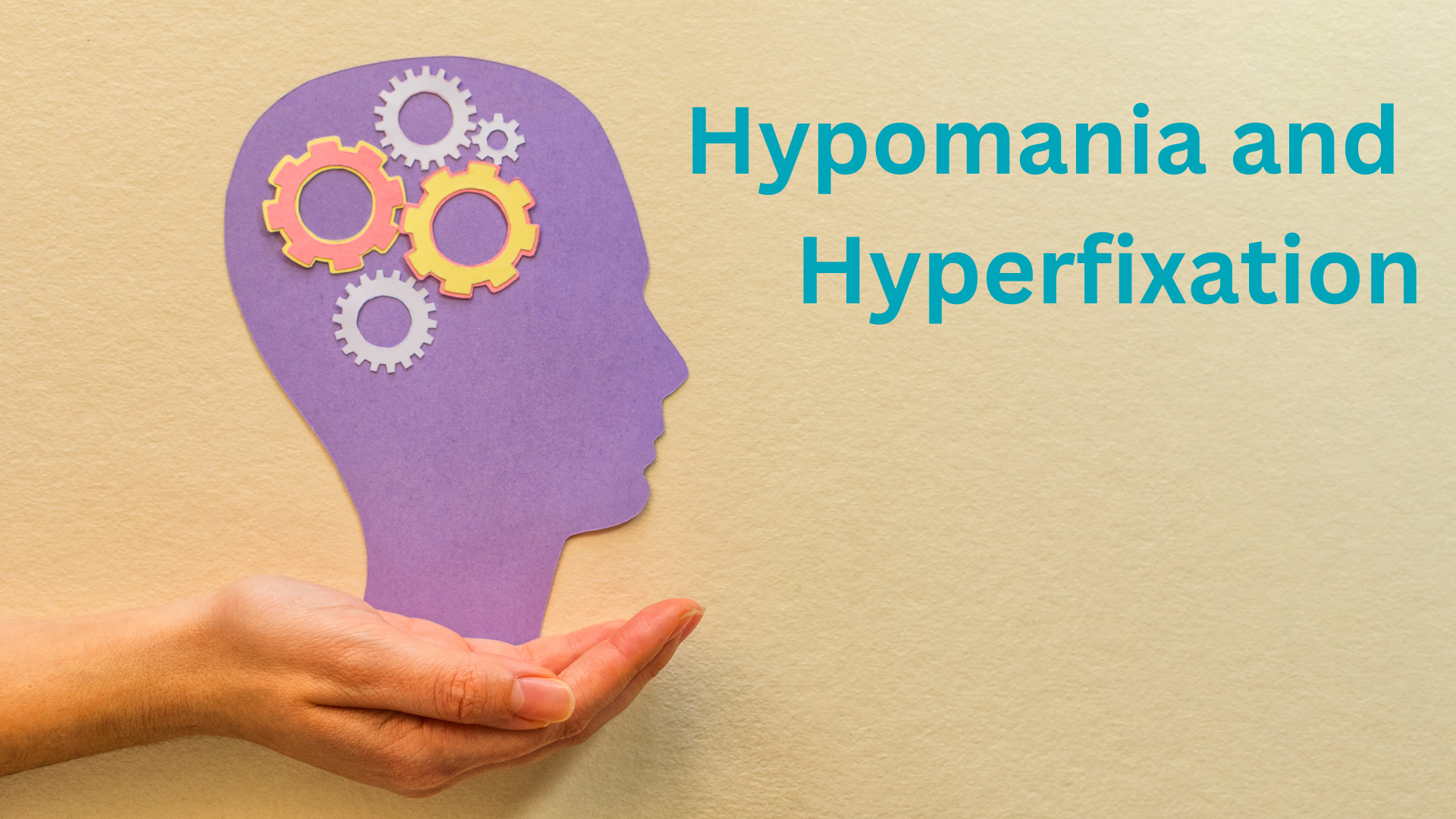
Hypomania and Hyperfixation: What’s the Difference?
Mental health conditions can manifest in various ways, and two related concepts that often come up in discussions about mental health are hyperfixation and hypomania. Hyperfixation is an intense preoccupation with a particular object, activity, or topic, while hypomania is a state of elevated mood and energy that is less severe than full-blown mania.
While both hyperfixation and hypomania can have a significant impact on a person’s life, they are distinct phenomena that are associated with different underlying conditions.
In this blog post, we will explore the similarities and differences between hyperfixation and hypomania, as well as their respective causes, symptoms, and treatments. Whether you or someone you know is struggling with hyperfixation or hypomania, understanding these concepts is an important step in seeking the right help and support for optimal mental health.
Are Hyperfixation and Hypomania the Same Thing?
No, they are not.
Hypomania is a specific syndrome that occurs in patients with bipolar disorder and is characterized by a period of at least four consecutive days during which a person experiences persistently elevated, expansive, or irritable mood and abnormally and persistently increased activity or energy.
Hyperfixation is a phenomenon that can occur in various mental health conditions. For instance, people with OCD can become hyperfixated on a specific obsession, individuals with generalized anxiety disorder may become hyperfixated on worries about the future, and those with PTSD or complex trauma can become hyperfixated on intrusive memories from the past.
Additionally, people with ADHD may become hyperfixated on projects they are highly interested in, while individuals with severe mental illnesses such as psychosis may become hyperfixated on a specific delusion.
In other words, it is clear that hyperfixation and hypomania are not the same thing.
Similarities between Hyperfixation and Hypomania
Hyperfixation and hypomania share some similarities in that they both involve a heightened state of focus and energy. In both cases, a person may feel driven to pursue a particular interest or activity, often to the point of neglecting other responsibilities or obligations.
Differences between Hyperfixation and Hypomania
However, there are also important differences between the two. Hyperfixation is not necessarily accompanied by changes in mood or energy level, whereas hypomania is a distinct state of elevated mood and activity. Hypomania is also a symptom of bipolar disorder, whereas hyperfixation may be seen in a range of conditions, including ADHD or Obsessive-Compulsive Disorder (OCD).
It is important to note that while hyperfixation may be a symptom of certain conditions, it is not itself a medical diagnosis. Hypomania, on the other hand, is a clinical syndrome that requires immediate evaluation and treatment by a mental health professional.
Hyperfixation refers to a strong and intense fixation on a particular object, activity, or topic, to the point where it becomes difficult to focus on anything else. Hypomania, on the other hand, is a symptom of bipolar disorder and refers to a state of elevated mood, energy, and activity that is less severe than full-blown mania. People experiencing hypomania may feel overly confident, euphoric, and impulsive, and may engage in reckless behavior, such as overspending, gambling, or sexual promiscuity.
How Are They Treated?
If you notice signs of hypomania or hyperfixation in yourself or someone you know, it is important to seek professional help. Here at NextStep2MentalHealth, our multidisciplinary team can assess the situation, provide an accurate diagnosis, and recommend an appropriate course of treatment.
For hypomania, treatment may include medication, therapy, or a combination of both. The specific treatment plan will depend on the severity of the symptoms, the underlying cause, and other individual factors. It is important to note that hypomania can escalate into full-blown mania if left untreated, which can have serious consequences on a person’s life and well-being.
For hyperfixation, treatment will depend on the underlying condition. For example, if hyperfixation is a symptom of ADHD, treatment may involve lifestyle modifications, therapy, medication, or a combination of both to help manage symptoms and improve daily functioning. If hyperfixation is a symptom of OCD, treatment may involve exposure and response prevention therapy, medication, or a combination of both.
It is crucial to seek help as soon as possible if you or someone you know is experiencing symptoms of hypomania or hyperfixation. Early intervention can lead to more effective treatment outcomes and a better quality of life.
We’re Here for You
If you are struggling with any sort of mental health issues — whether that’s signs of hyperfixation or signs of hypomania, seeking help from a mental health professional can make a significant difference in your life. Here at NextStep2MentalHealth, we understand that seeking help can be challenging, but we are here to support you every step of the way.
Our experienced mental health professionals provide a safe and supportive environment for you to explore your thoughts and feelings, develop coping strategies, and work towards your mental health goals. Don’t hesitate to reach out to us for help – we are here for you. Schedule your appointment here.
Learn More
How Spring and Daylight Savings Affects Hypomania
Bipolar disorder affects 4.4% of all adults at some point throughout their life, and about 2.8% of adults have been diagnosed with bipolar disorder in the last year, according to the National Institutes of Mental Health. Out of the adults diagnosed with bipolar disorder, nearly 83% experience extreme disruptions to their daily routines. Bipolar disorder is a mental health illness characterized by extreme shifts in mood that vacillate between manic episodes and depressive episodes, although each episode impacts your quality of life differently.
Interestingly, manic and hypomanic episodes tend to increase in the spring in the Northern hemisphere. In this article, we’ll help shed light on what manic episodes, why they tend to increase in the spring, and what you can do to stay proactive and reduce their impact on your quality of life.
What Is a Manic Episode?
According to the American Psychiatric Association’s Diagnostic and Statistical Manual of Mental Disorders (DSM-5), a person must have experienced at least one episode of mania or hypomania in order to be diagnosed with one of the bipolar disorders (in addition to the depressive episodes too.) A manic episode is more than just a mood swing. It is an emotional state in which a person may feel elevated or excessively irritable. Manic episodes can last anywhere from four days to a few months.
At first, you might not think that an elevated mood is a bad thing, and because of this, many people might not seek help at first. However, it’s important to note that mania isn’t just “feeling good”; rather, these symptoms are a departure from what’s normal for your i.e., your normal actions or behaviors.
Mania can be so intense that it can impact your performance at work and interfere with your relationships with friends and family.
How Spring Affects Hypomania and Mania
According to a study published in Psychiatry Investigation, the changes in light (and its impact on circadian rhythms) may be the culprit of increased hypomania episodes in the spring. According to researchers:
“A possible mechanism underpinning these relationships is a misalignment between the endogenous and environmental circadian rhythms due to acute circadian rhythm shifting caused by the increased light exposure in the spring.”
In other words, if you’re sensitive to seasonal changes and/or light changes, you may see changes in your bipolar symptoms. Some people with bipolar disorder are more sensitive to light than others: “The extra daylight, the lifting of winter’s gloom and the experience of again being outside in the bright, fresh, springtime air, all serve to activate bipolar neurochemistry.” (Source)
Why Treatment Matters for Manic Episodes
 “One of the most dangerous aspects is that multiple untreated manic or hypomanic episodes can be very harmful to the brain. They can sometimes even lead to cognitive impairment and/or decreasing IQ over time. (This can happen because leaving mania untreated is a lot like running a car eighty miles an hour all day, every day. Eventually the motor—the brain—will break down.),” says Dr. Brian Briscoe.
“One of the most dangerous aspects is that multiple untreated manic or hypomanic episodes can be very harmful to the brain. They can sometimes even lead to cognitive impairment and/or decreasing IQ over time. (This can happen because leaving mania untreated is a lot like running a car eighty miles an hour all day, every day. Eventually the motor—the brain—will break down.),” says Dr. Brian Briscoe.
The right treatment can also:
- Improve the quality of your life
- Can help you engage in relationships
- Can better equip you to succeed in the workplace
- Help stabilize mood changes and reduce symptoms
- Help prevent future manic or depressive episodes from occurring and reduce their overall intensity
Treatment for Manic Episodes
The primary treatments for bipolar disorder include medications (including mood stabilizers) and psychotherapy to control symptoms.
In addition to psychiatric care, there are many lifestyle changes that can support your mental well-being. This includes maintaining a regular exercise schedule, following a balanced, nutrient-dense diet, and attending your therapy sessions. For people who are more sensitive to changes in light, it’s even more important to practice good sleep hygiene practices.
Good sleep hygiene practices include:
- Going to bed at the same time every night
- Sleeping in a cool, dark room
- Avoiding TV or phone screens for 1-2 hours before bed
- Using the “night mode” on electronics in the evening
- Spending time outside in the morning (helps to set your circadian rhythm)
- Exercising (but not too close to bed)
In addition, it’s essential to adhere to your recommended medication schedules. If you need help remembering to take medication, try setting a reminder on your phone.
The Right Treatment Can Help
If you, or someone whom you love, are struggling with bipolar disorder, we can help. To make an appointment, call our office at 502-339-2442 or get in touch with us at to book an appointment with one of our compassionate and non-judgmental providers.
And please, if you’re not comfortable getting help from us, get help from another qualified doctor or therapist.
Because you can count on this: Life and the future, even with bipolar disorder, can and will be much brighter with treatment.
Learn More
6 Mental Health Wellness Tips
Are you looking for practical ways to achieve better mental health and balance in your life? These mental health wellness tips, which include practicing gratitude, connecting with others, and maintaining physical health can support your mental wellness.
Here at Next Step 2 Mental Health, we focus on a holistic and multidisciplinary approach when it comes to your mental health care. We don’t want you to “just get by”; we want you to thrive.
Mental Health Wellness Tips
Watch the video below for six simple tips for supporting your mental health.
1. Focus on the Positives
Look for solutions that may help you overcome any challenges.
2. Practice Gratitude
Keeping a gratitude journal is a great way to combat anxious thoughts. In fact, writing in a gratitude journal is shown to improve emotional resilience and reduce stress. There are many ways to keep a gratitude journal, but here are some tips:
- Journal first thing in the morning to start the day on a positive note.
- End the day with a quick reflection about things you were grateful for over the course of the day.
- If your child can’t write yet, she or he can draw pictures instead — yep, practicing gratitude is a great way for your child to promote his/her own mental wellness!
3. Connect with Others
This includes your friends, family members, and people in your support groups.
4. Maintain Physical Health
You can take care of your body by taking any prescribed medication as directed, eating right, and exercising regularly.
Eating right
You probably know that what you eat can energize you (or cause a blood sugar crash later on), but did you know that what you eat impacts your brain too? Foods rich in omega-3 fatty acids support brain health. This includes salmon, sardines, avocados, turmeric, walnuts, and chia seeds. For more brain-healthy foods, read “11 Best Foods for Your Brain.”
Exercise
Exercise is good for your body and mind — and it doesn’t have to be a rigorous routine either.
Good-for-the-brain exercises include:
- Hiking
- Playing sports like soccer or basketball (even if it’s in your backyard)
- Rollerblading
- Biking
- Dancing
- Jump rope
Walking around the block or playing tag in the yard are good options too!
Self-Care
Did you know that self-care is more than just a mani-pedi? (Although those are nice too!) Taking care of yourself includes:
- Scheduling doctors’ appointments, including regular physical and dental cleanings
- Taking any medication as prescribed
- Taking time each day to focus on things you love (like reading or coloring)
- Getting to bed on time each night
All of these things — eating right, exercising, and practicing self-care — all support your body and your mind.
5. Develop Strong Coping Skills
You can think of your coping skills as tools in your toolbox. If you’re stressed or overwhelmed, you can use these tools to manage stress levels. Coping skills for stress can include:
- Deep breathing exercising
- Exercising (or even walking around the block to “cool down”)
- Brain-storming solutions to the problem (rather than just dwelling on it)
- Knowing where to look when you need help (a friend, a therapist, etc.)
6. Seek Professional Help When You Need It
Sometimes, despite your best efforts at following these mental health tips, you require a little extra help — and that’s okay! Whether that’s therapy or medication, professional mental healthcare can help you get back on your feet.
Seek Help When You Need It
At Next Step, we know how profoundly any mental health condition can impact all aspects of your life, and if you’re struggling now, you don’t have to wait until it gets worse before reaching out for help. Our compassionate, non-judgmental team offers a variety of treatments, including medication and therapy.
To reclaim control over your life, call our Louisville, Kentucky office at 502-339-2442. You can also request an appointment online.
Learn More

10 New Year’s Resolutions for 2023 that Support Mental Wellness
Still need to make a few resolutions for 2023? It’s not too late!
In fact, there are many good New Year’s resolutions that can help support your mental wellness.
Let’s take a look at some examples.
10 New Year’s Resolutions to Support Your Mental Wellbeing
- Take any medication as directed
- Exercise regularly
- Get 7-9 hours of sleep each night (read: How Warm-Colored Lights Affect Your Sleep)
- Surround yourself with a supportive team
- Journal regularly (read: How Journaling Supports Mental Wellbeing)
- Eat nutrient-dense foods, especially fresh produce, lean protein, whole grains, and foods rich in omega-3 fatty acids
- Reach out for help if you need it
- Meditate or pray
- Listen to calming music (read: How Much Affects Mood)
- Set aside time to connect with friends or family
You don’t have to make any grandiose resolutions, especially if that will only add to your stress levels. Resolutions should be realistic goals that support your wellness — not detract from it. For example, if you find that “Journaling Daily” is too stressful, adapt your goal. Try journaling every other day or even simply once a week. Small steps can be a great way to create new habits!
How Can We Support Your Mental Well-Being?
If you need help managing a mental health condition, don’t hesitate to reach out to our multidisciplinary team. Click here to request your next appointment.
Learn More
Warning Signs of Depression in Children and Teens During the Holidays
The holidays can be a time of great joy, but for some, the holidays can be nothing short of stressful. In this article, we take a look at the warning signs of depression in teens during the holidays and what you can do to help your teen.
Let’s get started.
Understanding Why Holidays May Be Stressful
“The holidays can be a stressful time for adults, but it is often overlooked at how stressful holidays can be for children and teens,” according to Dr. Lisa Sanchez.
“The impression is that kids are happiest this time of year, but in reality, they are also navigating things like social stress, split homes, family losses, financial stress, school and this perfect image that’s portrayed in the media of how things should be. It is important to recognize these stressors and manage them.”
Is Stress… Or Depression?
How do you know if your child is stressed, depressed… or both? Let’s take a look at the symptoms of both.
Stress during the holidays
Stress can manifest itself in many ways. Increased stress can take a toll on your mental and physical wellbeing. Stress can lead to:
- Increased headaches
- Upset stomachs
- Agitation
- Nightmares and other sleep disturbances
- Anger
- Outbursts
- Inability to relax
- Increased worries and fears
If your child is stressed, you can help manage stress by modeling stress management techniques and establishing routines. Keeping your child informed of scheduling plans can help your child mentally prepare for the busy-ness of the season.
You can learn more about childhood stress in this article published on MedlinePlus by the National Library of Medicine.
Depression during the holidays
Chronic, unmanaged stress levels can increase your risk of developing a mood disorder, and that includes depression. This connection is called bi-directional, meaning stress can make depression worse, and depression can make stress worse.
Signs of depression in children and teens include:
- Feelings of intense sadness and emptiness
- Loss of interest in your normal family holiday traditions
- Feeling hopeless or guilty
- Being angry, irritable, or frustrated, even at minor things
- Loss of interest in hobbies and other favorite activities
- Loss of interest in talking to or spending time with friends and family
- Changes in weight, either gaining or losing weight
- Changes in sleep, either sleeping too much or too little
- Feeling restless
- Fatigue
- Physical pain, such as headaches or back pain
- Having trouble concentrating
- Thinking about dying or suicide
If you or a loved one are in crisis, call the Suicide & Crisis Hotline at 988. Help is available 24/7 in English and Spanish. You can also head to the closest emergency room.
About Dr. Lisa Sanchez
 Whether your teen is stressed or is showing signs of depression, we can help your teen feel better. Lisa Marie Sanchez, M.D., M.S.S.W, is a child and adolescent psychiatrist with NextStep.
Whether your teen is stressed or is showing signs of depression, we can help your teen feel better. Lisa Marie Sanchez, M.D., M.S.S.W, is a child and adolescent psychiatrist with NextStep.
Depression treatment often involves a combination of therapy and medication. Depression can increase stress, but remember, depression is treatable, and working to address both the stress and the depression at the same time can help your child feel better.
Here at Next Step 2 Mental Health, our multidisciplinary team offers everything your teen needs under one roof, from medication management to therapy.
To learn more about depression or to schedule an appointment, click here.
Learn More

What Is ACT Therapy?
Therapy is an umbrella term that refers to many different types of therapy. As a multidisciplinary practice, our team is experienced in many different types of therapy. In this article, we focus on ACT therapy, or Acceptance and Commitment Therapy.
Here’s what you need to know.
Overview of ACT Therapy
Watch the video learn more about Acceptance and Commitment Therapy:
Dr. Ethan Short and ACT Therapy
 Dr. Ethan Short has extensive experience working with adults with severe mental illness including schizophrenia and bipolar disorders, addictions (opiates, methamphetamine, benzodiazepines, alcohol, tobacco, etc.), PTSD, depression and anxiety disorders, and adult ADHD.
Dr. Ethan Short has extensive experience working with adults with severe mental illness including schizophrenia and bipolar disorders, addictions (opiates, methamphetamine, benzodiazepines, alcohol, tobacco, etc.), PTSD, depression and anxiety disorders, and adult ADHD.
He is trained in multiple psychotherapies, but primarily practices Acceptance and Commitment Therapy as an alternative to medication, or as an adjunctive treatment for the above conditions.
Dr. Short shares his approach to care:
“Our mental health care system has significant problems. Oversimplification of complex mental health diagnoses and overmedication of patients are disturbing trends. While psychiatric medications do improve symptoms, they rarely address the underlying causes of the problem.
This concept is similar to taking Tylenol for a fever; Tylenol will reduce, but not cure the fever.
Individualized, collaborative, and sometimes innovative regimens, along with taking the time to get to know patients, are paramount to treatment. I offer a holistic and evidence-based approach using a combination of medication, reliable supplements, diet, exercise, and Acceptance and Commitment Therapy. ACT is best summarized as psychological flexibility; it emphasizes 6 processes that help people to accept themselves, understand and positively impact their struggle against the inner voice, and live with purpose.”
The Six Processes of ACT Therapy
ACT therapy emphasizes six processes that help people. These processes promote psychological flexibility and include:
1. Acceptance: acknowledging and embracing (rather than avoiding) the full range of your emotions and thoughts
2. Cognitive Defusion: the process of changing the way you react to distressing thoughts and feelings
3. Being Present: the process of mindfulness in which you are present in the moment and can acknowledge your feelings without judgement
4. Self as Context: the idea that you (and all people) are more than just your thoughts, feelings, and/or experiences.
5. Values: the process of choosing your own personal values (and living according to them) rather than adhere strictly to other people’s values and/or expectations
6. Committed Action: the process of taking tangible and concrete steps to incorporate changes based on your own personal values that can lead to positive change in your life through goal setting, exposure, and skill development.
When Can ACT Therapy Be Used?
ACT can help treat many mental and physical conditions. These include:
- Substance use disorders
- Anxiety disorders, including obsessive-compulsive disorder)
- Depression
- Eating disorders
- Workplace stress and chronic stress
Is ACT Therapy Right for You?
If you need help managing mental health conditions, know that help is just a call or click away. Our multidisciplinary team can shape a treatment plan that includes lifestyle modifications, medication, and therapy. To schedule an appointment and learn more about your potential treatment options, give us a call at our Louisville, Kentucky mental health clinic at 502-339-2442 or click here.
